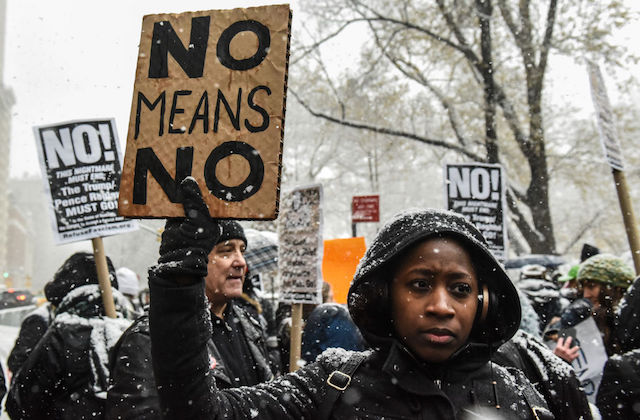We made it through 2017! But sometimes, it looked like we wouldn’t survive a year that seemed intent on shaking up the status quo. Many suvivors of sexual harassment and assault broke their silence, forcing a reckoning for some men who seek to control the bodies and careers of others. In this installment of The New Normal, Colorlines contributing editor Ayana Byrd explores how survivors reclaimed their power this year.
#MeToo. Two words made into one. And in that one word is everything. It is rage and permission and community and the potential to tear down the old guard.
MeToo, I was attacked. MeToo, I was harassed. MeToo, I was not believed. And the hope: MeToo, I am heard.
#MeToo came from the grassroots, a phrase coined by activist Tarana Burke as a call for solidarity and healing for young people of color who survived sexual assault. But it did not go viral until it went to Hollywood, with Alyssa Milano responding to accusations against Miramax mogul Harvey Weinstein by tweeting on October 15, “If you’ve been sexually harassed or assaulted write ‘me too’ as a reply to this tweet.” The next day, she woke up to more than 30,000 responses.
For many women and some men, the new normal of 2017 means waking up not just to their own memories—distant or fresh—of being sexually harassed or assaulted, but to articles about famous and powerful men who have committed these acts.
Before Weinstein, in April, Fox News fired its biggest star, Bill O’Reilly, after spending $13 million to settle sexual harassment allegations against him from five women. Soon after Weinstein, the Los Angeles Times interviewed 38 women who said producer James Tobak sexually harassed or assaulted them (the number of accusers is now over 300). Since then, there has been a deluge of stories, from actresses to Plaza Hotel employees to migrant farmers.
Some of the men’s names are famous: Russell Simmons, Tavis Smiley, Matt Lauer. So are some of the men and women they attacked or harassed: Lupita N’yongo, Terry Crews, Annabella Sciorra.
Time magazine reports that in the first week after Milano’s "me too" tweet, there were versions of the phrase in more than 85 countries. Some two months later, actress Salma Hayek shared her story in The New York Times, writing how Harvey Weinstein was her “monster, too.”
The essay ended with these words, two sentences on what may be the new normal: “Men sexually harassed women because they could. Women are talking today because, in this new era, we finally can.”
